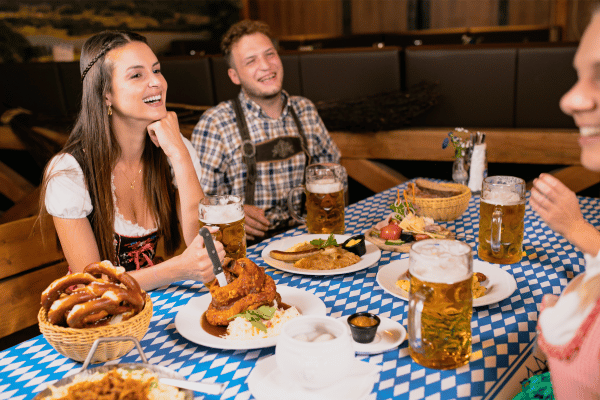Dive into the heart of Munich’s famous Oktoberfest, far beyond its renowned beer gardens. This article unveils the rich tapestry of traditions, music, and cuisine that define the Oktoberfest cultural experience. Join us as we journey through the vibrant festivities, exploring the deeper cultural heritage that makes this event a global phenomenon.
Introduction to Oktoberfest: More Than Just Beer

Initially, Oktoberfest transcends the conventional notion of a mere festival; it embodies a dynamic and colorful homage to Bavarian traditions. Annually, Munich undergoes a remarkable transformation, becoming a hub that attracts millions eager to immerse themselves in longstanding customs. The festival’s atmosphere is electric, with its grounds adorned by a mosaic of vivid tents brimming with joy and camaraderie, presenting a fusion of amusement and rich cultural legacy that captivates and delights.
Moreover, the essence of the Oktoberfest cultural journey reaches far past the mere toasting with beer steins. It unfolds as a sensory expedition, enriched by the enticing scents of roasted almonds, the visual feast of detailed lederhosen, and the melodious backdrop of folk music permeating the atmosphere. This festival is a living tapestry, where each nook narrates its own tale and every dance embodies a heritage meticulously handed down across generations.
In conclusion, to fully embrace the Oktoberfest cultural experience is to dive into the core of German celebration. It’s a place where new friendships blossom amidst communal gatherings, and Munich’s vibrant spirit truly shines. The festival stands as a powerful symbol of communal joy, marked by an enduring warmth that resonates with attendees well beyond the closing parade, leaving a lasting impression of unity and festivity in their hearts.
Munich Traditions: The Heart of Oktoberfest
Firstly, delving into Munich traditions reveals the soul of Oktoberfest. It’s a festival steeped in history, where ancient customs come alive. The grand opening parade is a spectacle, showcasing vibrant costumes and majestic horses, a tradition cherished by locals and visitors alike.
Furthermore, the tapping of the first beer keg is a pivotal Munich tradition, symbolizing the official start of Oktoberfest. The Mayor’s proclamation, “O’zapft is!” or “It’s tapped!” echoes through the festival, igniting a wave of cheer. This moment captures the essence of community and celebration, central to the Oktoberfest cultural experience.
Lastly, the traditional Bavarian dance performances are a highlight, drawing crowds from all corners. Dancers in elaborate costumes whirl and stomp, their movements telling tales of folklore and history. This display of heritage and artistry is a testament to the enduring spirit of Munich’s traditions, keeping the cultural flame of Oktoberfest burning bright.
Exploring German Folklore and Legends
Firstly, Oktoberfest is a treasure trove of stories, where German folklore and legends come to life. The festival is imbued with tales of mythical creatures and epic heroes, narrated through captivating puppet shows and theatrical performances. These stories, passed down through generations, add a layer of enchantment to the festivities.
Moreover, the festival grounds become a canvas for the rich tapestry of German folklore. Stalls and attractions are often themed around legendary tales, offering a glimpse into the mystical past. The air is filled with the spirit of adventure, inviting festival-goers to journey through time and explore the roots of these ancient narratives.
Lastly, the integration of folklore into the Oktoberfest experience enriches the cultural journey. Traditional music and dance performances often depict scenes from well-loved legends, bringing them to life with vibrant energy. This fusion of history and celebration creates a unique atmosphere where the past and present coalesce, offering a deeper understanding of German heritage.
Savoring Bavarian Cuisine: Beyond Pretzels and Sausages

Firstly, the culinary journey at Oktoberfest is as diverse as it is delicious. Beyond the iconic pretzels and sausages, the festival offers a plethora of Bavarian delicacies. Each dish tells a story, from hearty dumplings to savory roast pork, reflecting the rich agricultural heritage of the region.
Moreover, exploring the variety of traditional foods is a must-do for any visitor. The scent of freshly baked bread mingles with the smoky aroma of grilled meats, leading festival-goers on a tantalizing adventure. The flavors of Bavarian cuisine are a testament to the region’s culinary expertise, crafted with care and tradition.
Lastly, indulging in these culinary delights enhances the Oktoberfest experience. The communal tables offer a chance to share meals and stories, creating a sense of unity and festivity. It’s here, amidst the laughter and clinking glasses, that the true spirit of Bavarian hospitality shines, inviting all to savor the richness of its cuisine.
The History Behind the Iconic Beer Tents
Firstly, the beer tents of Oktoberfest are not just structures; they are monuments to festivity and fellowship. Each tent has its own story, steeped in tradition and history. They are a testament to the craftsmanship and dedication of the Bavarian people, evolving from simple stalls to grand pavilions that host thousands.
Moreover, the genesis of these tents traces back to the festival’s inception. Initially modest, they have grown in size and splendor, reflecting the expanding popularity of Oktoberfest. The intricate designs and familial atmospheres of these tents are a nod to Munich’s rich cultural tapestry, inviting festival-goers from around the globe.
Lastly, stepping into any of the beer tents is like entering a different world. Inside, the blend of music, laughter, and the clinking of steins creates a symphony of joy. This environment, a product of centuries of evolution, encapsulates the Oktoberfest cultural experience, making each visit unforgettable.
Dressing Up: The Significance of Festival Attire
Firstly, festival attire at Oktoberfest is a vibrant expression of Bavarian culture and identity. The traditional lederhosen and dirndls are more than just clothing; they are symbols of pride and heritage. Each piece, intricately crafted, tells a story of the region’s history and craftsmanship.
Moreover, the act of dressing up in these traditional outfits creates a sense of unity and belonging among festival-goers. It’s a way to honor the customs and traditions that have shaped the Oktoberfest cultural experience. The variety of styles and designs seen at the festival showcases the diversity within Bavarian culture itself.
Lastly, wearing the traditional attire is a rite of passage for many, a way to fully immerse in the Oktoberfest festivities. It’s an invitation to step back in time, to celebrate with authenticity and joy. This deep connection to heritage is what makes the festival attire not just clothing, but a key part of the Oktoberfest legacy.
Local Crafts and Souvenirs: Bringing a Piece of Oktoberfest Home
Firstly, the artisanal stalls at Oktoberfest are a kaleidoscope of local craftsmanship, offering a wide array of unique souvenirs. From hand-carved wooden ornaments to bespoke jewelry, each item carries the essence of Bavarian artistry. These markets are a testament to the region’s rich tradition of craftsmanship, inviting festival-goers to take a piece of Oktoberfest home.
Additionally, the intricate craftsmanship and attention to detail in these creations showcase the dedication and expertise of local craftsmen. Wandering through the lively thoroughfares, visitors find themselves immersed in a realm of artistic innovation and tradition. This experience offers a chance to delve deeper into the cultural foundations of Oktoberfest, moving past the customary beer and merriment to a more profound connection with its origins.
Lastly, acquiring a local craft is more than just a purchase; it’s an act of preserving and celebrating Bavarian culture. Each souvenir, whether a delicate piece of pottery or a robust stein, serves as a tangible reminder of the Oktoberfest experience. It’s these cherished keepsakes that keep the spirit of the festival alive, long after the tents have come down.
The Sounds of Oktoberfest: Traditional Music and Dancing
Oktoberfest is enveloped in the dynamic melodies of traditional music, a cornerstone of the festival’s atmosphere. The air resonates with everything from spirited polkas to emotive folk songs, each note crafting a mosaic of Bavarian heritage. This musical backdrop dictates the festival’s pace, steering the dance moves and joyous laughter that echo throughout the vibrant tents, infusing the event with a palpable sense of cultural rhythm and unity.
Furthermore, the dance arenas burst into life with the swirling of dirndls and the rhythmic stomping of lederhosen. Participants spanning various ages converge on the scene, exhibiting age-old dance moves inherited through generations. This vibrant fusion of dance and melody during Oktoberfest stands as a vibrant homage to the timeless allure of Bavarian customs, celebrating their continued relevance and joyous spirit in the modern festivity.
In conclusion, whether one is actively engaging in the dances or appreciating the tunes as an onlooker, it forms an integral aspect of the Oktoberfest cultural journey. The harmonious mix of accordion melodies, brass band performances, and exuberant vocals conjures a festive symphony. It is within these instances that the authentic essence of Oktoberfest radiates, weaving together all attendees in a collective revelry of heritage and camaraderie.
Family-Friendly Fun at the Oktoberfest
Oktoberfest transcends being an adult-only event, presenting an array of activities suitable for families and children alike. The festival is dotted with attractions ranging from exhilarating carnival rides to enchanting puppet shows, transforming the venue into a wonderland of happiness and giggles for the younger crowd. Such a welcoming and inclusive vibe guarantees that families can partake in the celebrations collectively, forging unforgettable moments and cherished memories together.
Furthermore, the festival diligently creates a secure and pleasant atmosphere for its younger attendees. It earmarks specific days for lower decibel levels and milder tunes, crafting a kid-friendly ambiance. Such mindful measures underscore the festival’s dedication to fostering an inclusive environment, welcoming families with open arms and ensuring their experience is both comfortable and memorable, reflecting its deep commitment to catering to visitors of all ages.
Finally, participating in these child-friendly endeavors offers a splendid opportunity for both parents and offspring to delve into the cultural depth of Oktoberfest. Be it the awe of witnessing the vibrant parade or the pleasure of savoring customary delicacies, such collective experiences cultivate a profound respect for the festival’s heritage and the communal bliss it embodies, enhancing the familial bond and enriching the overall festive experience.
Sustainable Tourism: Enjoying Oktoberfest Responsibly
Firstly, in recent years, there has been a growing emphasis on sustainable tourism at Oktoberfest. The festival has implemented various eco-friendly practices, aiming to reduce its environmental footprint. Initiatives like recycling programs and the use of biodegradable materials for food and drink containers showcase a commitment to sustainability.
Moreover, festival-goers are encouraged to partake in these green efforts by utilizing public transportation, participating in waste reduction activities, and supporting local vendors. This collective action towards sustainability not only enhances the festival experience but also sets a positive example for large-scale events worldwide.
Lastly, enjoying Oktoberfest responsibly involves a conscious effort to respect the local culture and environment. By embracing sustainable practices, visitors contribute to preserving the beauty and integrity of Munich and its beloved festival. This responsible approach ensures that the Oktoberfest cultural experience can be cherished by future generations.
In Summary
In conclusion, the Oktoberfest cultural experience transcends the mere enjoyment of beer; it’s a vibrant celebration of Bavarian traditions and global unity. The festival’s rich tapestry of music, dance, and culinary delights offers a unique insight into the heart of Munich’s cultural heritage. It’s an annual event that brings together people from all walks of life, fostering a sense of community and shared joy.
Moreover, the festival’s commitment to sustainability and inclusivity ensures that it remains a cherished event for generations to come. By participating in Oktoberfest, visitors not only immerse themselves in German culture but also contribute to the preservation of this iconic celebration. It’s a testament to the festival’s enduring appeal and its ability to adapt to contemporary values while honoring its historical roots. Lastly, the Oktoberfest cultural experience is a journey through the heart of Munich’s traditions, a celebration that goes beyond the steins to touch on the very essence of communal festivity and cultural appreciation. It’s an invitation to explore, enjoy, and respect the rich tapestry of customs that make Oktoberfest a world-renowned event. This festival truly embodies the spirit of togetherness, making it an unforgettable experience for all who attend.
III. Frenquently Asked Questions About Germany
- How is the German economy structured?Germany has a social market economy, being the largest in Europe and known for its engineering, manufacturing, and exporting prowess, particularly in the automotive, machinery, and chemical sectors.
- What are some environmental initiatives in Germany?Germany is a leader in environmental sustainability, with initiatives focusing on renewable energy, waste reduction, and conservation efforts, aiming to become carbon neutral by 2050.
- What should I know about German beer culture?German beer culture is integral to its social fabric, with over 1,300 breweries producing thousands of beer varieties. Reinheitsgebot, or the Beer Purity Law, ensures the quality of German beer by limiting ingredients.
- Can you explain the significance of German castles?German castles, such as Neuschwanstein and Heidelberg Castle, are steeped in history, offering insights into the country's medieval past, fairy-tale landscapes, and architectural marvels.
- How does the German political system work?Germany is a federal parliamentary republic, with the Chancellor as the head of government. It has a two-chamber parliament: the Bundestag (Federal Diet) and the Bundesrat (Federal Council), representing the 16 federal states.
- What are some traditional German crafts and industries?Traditional German crafts include cuckoo clocks from the Black Forest, porcelain from Meissen, and beer steins. These industries reflect Germany's rich cultural heritage and craftsmanship.
- What are the visa requirements for visiting Germany?Visitors from many countries can enter Germany without a visa for stays of up to 90 days for tourism or business purposes. However, it's essential to check the latest visa requirements based on your nationality.
- What is the German approach to work-life balance?Germans highly value work-life balance, with laws regulating working hours and vacation entitlements. Many businesses close early on Saturdays and remain closed on Sundays, emphasizing the importance of leisure and family time.
- How is soccer integrated into German culture?Soccer (football) is deeply ingrained in German culture, with passionate support for local and national teams. The Bundesliga is one of Europe's top soccer leagues, and Germany has won the FIFA World Cup four times.
- What are some tips for shopping in Germany?When shopping in Germany, look out for local specialties and crafts, such as Bavarian lederhosen, Berlin's avant-garde fashion, and traditional Christmas ornaments. Most shops are closed on Sundays, except for some bakeries and convenience stores.

Ryan Taylor, a seasoned traveler with over a decade of experience exploring Europe’s nooks and crannies, offers a wealth of knowledge and unique insights into the continent’s diverse cultures and landscapes. His passion for travel began in his early twenties, and since then, Ryan has journeyed through numerous European countries, collecting stories, tips, and a deep understanding of each destination’s unique charm. His blog entries are not just guides but narratives enriched with personal experiences, making every recommendation and piece of advice relatable and practical for fellow travel enthusiasts. With a keen eye for hidden gems and a love for sharing his adventures, Ryan’s writings are a treasure trove for anyone seeking to discover the beauty and richness of Europe.






